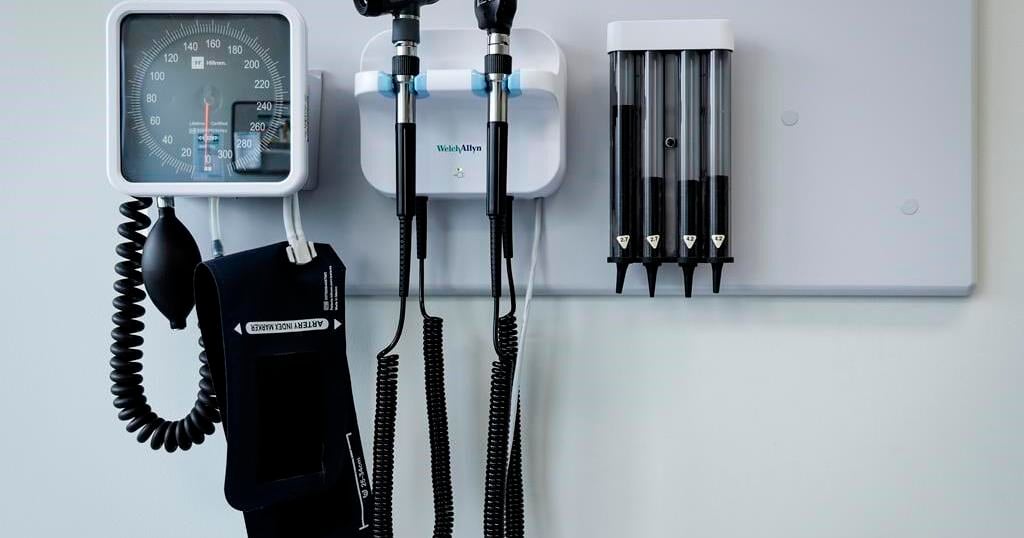In a haunting message from beyond the grave, Métis Elder Sonny James MacDonald recounted being incarcerated for more than two years at an Indian Hospital in Edmonton in the 1940s for tuberculosis treatment, suffering abuse and isolation as a child.
“After the surgery … they took it upon themselves … that they should take my pajama bottoms off to prevent me from walking around,” MacDonald, a renowned carver who died in 2021, said in a video clip taken from a documentary release that same year.
“I was put in this little room … there was no window, it was the end of the hallway. I was just like a prisoner,” he said. MacDonald said an orderly would trap him in a hospital washroom and sexually assault him.
MacDonald’s story echoed in a Victoria conference hall Wednesday where the Canadian Medical Association formally apologized for physicians’ role in causing harm to Indigenous Peoples in a sombre ceremony.
Dr. Joss Reimer, president of the association, said they are “deeply ashamed” of their actions and inactions throughout Canadian history, leading to racism, neglect and abuse toward First Nation, Inuit and Métis community members.
“As an association, our purpose is to support the medical profession and create a more sustainable, accessible and equitable health system for all patients and providers,” Reimer said. “In failing to address systemic anti-Indigenous racism in health care, we have failed to fulfil this purpose.
“We have not lived up to the ethical standards the medical profession is expected to uphold.”
The association said it underwent a multi-year review of its archives and other documented interactions with Indigenous communities, finding a long history of harm caused by the Canadian doctors.
Dr. Paula Cashin with the association says research showed physicians contributed to “systemically embedding and upholding” anti-Indigenous racism into Canada’s health-care systems and policies, creating an “unsafe environment” for patients from Indigenous communities.
Among the top misdeeds are the Indian hospitals that were put in place, which Cashin said created “racial segregation” where Indigenous patients received “substandard” care.
Cashin said some children were also subjected to experiments at residential schools on malnourishment and withholding necessary care to study the effects they had on humans. The full extent of how much experimentation was conducted is still unknown.
There was also forced relocations of Inuit community members to tuberculosis sanitoriums against their wishes, resulting in many dying far from their homes.
The latest case of forced sterilization against a member of the community was reportedly as recent as 2019, Cashin said.
“Patients were subjected to abuse, experimental treatments and forced and coerced sterilization,” she said. “Although most Indian hospitals are now closed, the country is still in the process of moving away from the segregated, racist health-care model that the Indian hospital system perpetuated.”
Speaking at the ceremony, Métis Elder Jimmy Durocher said the apology from physicians is important because “we need to know the truth before we can have reconciliation.”
“By issuing this formal apology, the Canadian Medical Association has taken the first steps in its commitment to seeking the truth,” Durocher said. “It’s just a first step. It’s going to be a long process … it’s going to take a long time because there’s a lot of damage and harm that was done to our people.”
Reimer, the CMA president, said the association is committed to owning its past wrongs and doing whatever it can to right those wrongs, but added the path toward reconciliation will not always be easy.
“We humbly acknowledge that we are on a learning journey,” she said. “We will make mistakes despite our best efforts. But we commit to acknowledging those mistakes, learning from them and continuing forward in a meaningful, tangible and sustained way.”
Dr. Alika Lafontaine, who in 2022-2023 became the first Indigenous president in its 157-year history, said the CMA will now focus on advancing health care for Indigenous Peoples, supporting physicians to improve and making sure the group operates with the principles of reconciliation.
The association also said it is committed to tracking physicians’ progress in addressing the harms caused, which includes providing regular updates about the association’s Indigenous health initiatives.
This report by The Canadian Press was first published Sept. 18, 2024.
